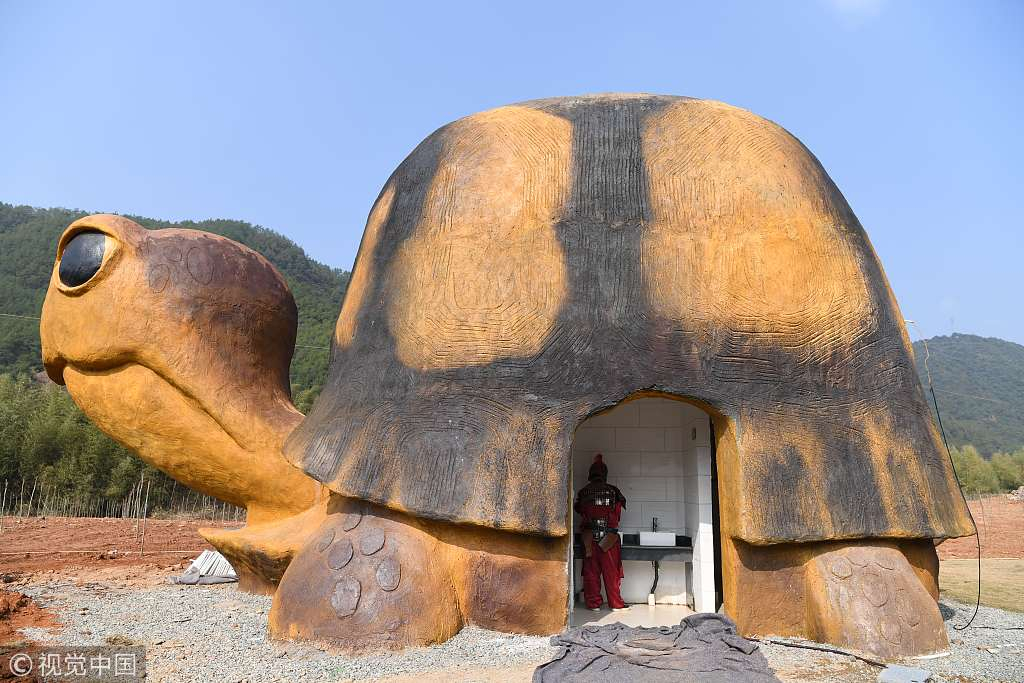
18:07, 28-Feb-2019
Full episode – Toilet Revolution in China: Progress, challenges, prospects

Toilets are taboo topics. They shouldn’t be; while we all go there often, no one likes to talk about them.
China is now in a New Era, facing the principle contradiction between unbalanced and inadequate development and the people's ever-growing needs for a better life.
For China to become a more civilized society, the hygiene of the masses must be improved - especially in rural areas - and for China’s tourism industry to blossom, better bathrooms are needed.
Let’s be candid. Although China has become the world's second-largest economy, toilets in poor rural areas are often still little more than makeshift shelters surrounded by bunches of trees and weeds, while others are open pits next to pigsties, leading to contamination from human waste, which finds its way into the food chain.
Even in urban areas, many toilets give off a noxious and notorious odor that is detectable in hallways well beyond bathroom doors.
I remember (all too vividly) experiencing toilets in China during the first years when I began visiting in the 1990s: I dreaded the experience. Even in ministries in Beijing.
Even in the 2000s, a senior leader lamented, “We can send a man into earth orbit. Why can’t we make toilets that don't smell?”
In China, the “Toilet Revolution” has become a buzzword; the government has launched two successive three-year action plans.
How are they working? What challenges remain?

An intelligent toilet with Wi-Fi and vacancy display screen, Wuhan, Hubei Province. January 21, 2019. / VCG Photo
An intelligent toilet with Wi-Fi and vacancy display screen, Wuhan, Hubei Province. January 21, 2019. / VCG Photo
Toilets are well labeled “the barometer of civilization” and China has well determined that sanitary toilets are essential for the realization of a moderately prosperous society, China’s goal for 2020.
For tourists, public toilets make an instant and lasting impression, characterizing the entire country.
In late 2017, President Xi Jinping called for China to continue to upgrade the country's toilets as part of an ongoing "toilet revolution" campaign.
When visiting rural areas, Xi often asks local residents about the conditions of their toilets, stressing that clean toilets are vital for building a "new countryside." Xi’s point is probative.
Challenges remain: obviously insufficient funding and regional imbalances, but also weak sanitary awareness.
China’s toilet revolution exemplifies how the CPC’s new “principal contradiction” drives policy, addressing the contradiction between “unbalanced and inadequate development and the people’s ever-growing needs for a better life.”
China is now the largest toilet market in the world, and, with its experience, the country should help developing countries improve their sanitation facilities.
According to a 2015 UN report, one in three people worldwide (2.4 billion) still used poor sanitation facilities.
With respect to toilets, I want to applaud three individuals.
President Xi for working to improve the standards of living of the poor via modern toilets, irrespective of whether some critics may think ‘talking toilets’ downgrades his presidential dignity.
Vice Minister Li Jinzao, for pioneering and promoting toilet development for two decades, long before it was socially or politically acceptable.
Jack Sim for his vision, humor and irrepressible energy in bringing “toilet” into the global discourse, greatly improving global health. Jack Sim, it is a delight to watch how one human being, without the levers of government or corporate power, and without great personal wealth, can make such a positive impact on all humanity.
Today, in the cities, I have no worries about toilets, and even in many rural areas the improvement is remarkable.
To know China’s Toilet Revolution is to know the real China. Foreigners follow China’s economy carefully, and they watch, sometimes suspiciously, as China engages with world geopolitics. Many such foreigners think they know the real China, but if they are unware of President Xi’s commitment to improving China’s toilets, they do not know the real China. That is why following China’s toilet revolution, can keep us... Closer To China.
SITEMAP
Copyright © 2018 CGTN. Beijing ICP prepared NO.16065310-3
Copyright © 2018 CGTN. Beijing ICP prepared NO.16065310-3